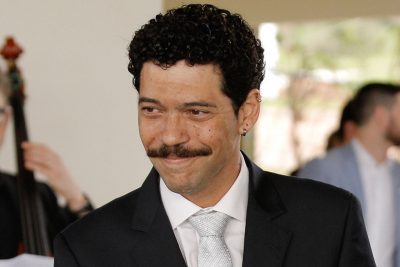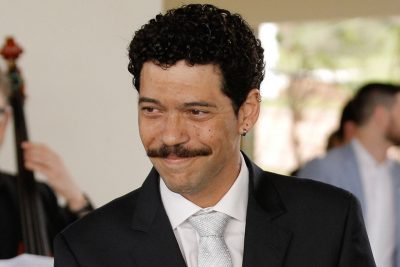
Luis Ferreira will begin his Ph.D. studies in educational psychology this spring after facing unforeseen obstacles in obtaining a visa to study in the United States. Accepted to UConn’s Neag School of Education in February 2020, he has made tremendous sacrifices to pursue his doctorate, including moving away from his wife and family in Brazil.
Ferreira was unsuccessful in obtaining a visa in Brazil due to COVID-19 regulations, so he moved to Portugal for four months, where he holds dual citizenship. He secured his student visa while in Portugal and arrived in Connecticut in late December.
“It makes me feel very special to be able to go there,” said Ferreira while anticipating his arrival at UConn. “I’m going there to learn and to translate what I learn to other people.”
Ferreira’s story of sacrifice and enthusiasm for studying at the Neag School, as well as his impressive skill set and experiences, earned him scholarship support through the Joseph Renzulli and Sally Reis Renzulli Fund for Graduate Studies in Gifted Education.
“I hope to contribute what I’ve learned to help [students] develop their talents.”
— Luis Ferreira,
Joseph Renzulli and Sally Reis Renzulli Fund Recipient
The scholarship is awarded by faculty nomination, and determined based on financial need and desire to make a difference in education. Joseph Renzulli and Sally Reis have been at UConn for decades, making the graduate program in Gifted Education and Talent Development their life’s work.
“We’ve had the opportunity to work with and mentor students from all over the world,” says Reis. “They make a very large investment, and we wanted to make an investment in them.”
Reis says they selected Luis because of his passion, creativity, and desire to make a difference in education through his future work.
“It’s an honor for us to see him get this award,” says Reis. “He wants to go back to his country and make a difference in education, and we are so proud to support that dream.”
An Intersection of Sport and Education
Ferreira has spent several years working with top athletes, some of whom became Olympic champions and world-record breakers. While working towards his master’s degree at the University of Brasília, he trained athletes using psychological tools such as mentalization, a technique that uses mental rehearsal to prepare and test strategies for competition. He also used the biofeedback technique on athletes which utilizes machines that read electric signals in the body and help athletes with stress control.
Ferreira described these techniques as self-regulation tools, designed to increase maximum potential. He’s studied this methodology in major athletic competitions across the globe, including Germany, Scotland, Portugal, and Mexico.
“During my research, I found that several of the texts I was reading came from people at UConn, people like Joseph Renzulli, Sally Reis Renzulli, and Del Siegle,” says Ferreira.
“He has worked as a sports psychologist and he’s worked with world-class athletes. He is interested in motivation and what causes people to really develop to their full potential.”
— Del Siegle, Lynn and Ray Neag Endowed Chair for Talent Development
He learned from reading Professor Del Siegle’s work that people need to use tools that are meaningful to them, especially self-regulation tools, in order to develop their talents. Applying this concept to athletes, Ferreira found the tools used were well-understood and accepted.
“I took something that Professor Del Siegle was proposing, and I saw it in a practical way in sports, and then I thought maybe now’s the time to attempt coming to UConn to see if I can study with the people that I had been reading about,” says Ferreira.
Siegle now serves as Ferreira’s academic advisor. He says there was a natural connection between them because they are both interested in developing excellence, but have been working in different domains. The two hope to learn from each other and see how their findings in the education and sport worlds overlap.
“The cool thing about it is there is this interdisciplinary thing going on because he has worked as a sports psychologist and he’s worked with world-class athletes,” says Siegle. “He is interested in motivation and what causes people to really develop to their full potential.”
Transitioning to the Academic World
Ferreira had always intended to enter the academic field after working in sport psychology, referring to education as “the key to a better world.” He says he hopes to apply the talent development approaches he learned from working with athletes toward helping students reach their highest potential.
“I hope to contribute what I’ve learned, not to make people world champions, but to help them develop their talents in an easier way and help them deal with stress in an easier way so they don’t feel overwhelmed by situations,” says Ferreira.
He says he never could have imagined receiving a scholarship from Renzulli and Reis, describing them as two of the most influential scientists in the field of talent development.
“It’s an honor to receive this scholarship and to know that your peers respect you,” says Ferreira. “I know who I am, and I know what I can contribute, but I feel thankful and I feel I should work a lot to deserve this.”
For more information on supporting students like these, visit s.uconn.edu/neaggiving.



